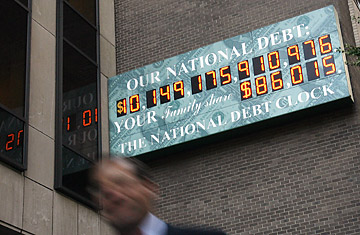
The Debt Clock near Times Square in NYC.
When out-of-control federal spending runs smack into sluggish tax revenues, red ink splashes all over Washington. In September, the Congressional Budget Office estimated that the deficit this year would be $407 billion, a sum that reflected the $168 billion economic stimulus package approved by President Bush in February and the estimated $188billion spent for the wars in Iraq and Afghanistan through 2008. Add to that the $700 billion financial bailout package passed in October, plus another economic stimulus package likely to take shape in the coming months that could cost as much as $175 billion, and you're talking about an all-inclusive fiscal 2008 deficit exceeding $1 trillion.
You won't likely see such huge numbers leading the networks' evening newscasts because deficit talk is akin to Washington wonk speak. But Dave Walker, former Comptroller General of the U.S. and now President of the Peter G. Peterson Foundation, is out to change that and bring the big picture of deficit woe to America's attention.
"We've got all kinds of warning indicators going off, and people are asleep,"said Walker, said, Walker, whose New York think tank seeks to promote awareness about the debt problem. (Walker stars in the August-released feature documentary, I.O.U.S.A., which focuses on the nation's credit binge.)
It's not even the current deficit, as big as it is, that causes so much concern, says Walker. The deficit merely represents the amount that government spending exceeds its revenues in a given year. A far bigger concern is the national debt — the total of what we've cumulatively borrowed to finance those yearly deficits. Sometime around 2020, according to projections offered by Walker's foundation, the U.S. debt will be equal to or greater than annual gross domestic product — a situation not seen since 1946 at the end of World War II. Worsening the picture is the fact that much of that debt is held by international lenders, chiefly China and Japan, who could grow wary of financing our spending and cut off funds, effectively leaving the U.S. in crisis.
Despite Walker's best efforts, voter resistance to deficit spending may be on the wane. "We're going to see an evaporation of concern about fiscal restraint simply because the threat of an economic collapse is so great," said Robert Reischauer, president of the Urban Institute. "Policymakers are not going to adhere to the restraint that they know in their heads we need but in their hearts can't bring about."
Walker is more optimistic — and determined. The current economic turmoil, he says, could serve as the best warning yet to policymakers and the public of more long-term problems fast approaching. "It's important that the federal government deal with the immediate but start taking steps to be able to defuse our fiscal time bomb so we can avoid what I refer to as a super subprime crisis associated with the federal government's finances down the road," said Walker. "We need to start making progress on multiple fronts at once."
(See pictures of the week here.)